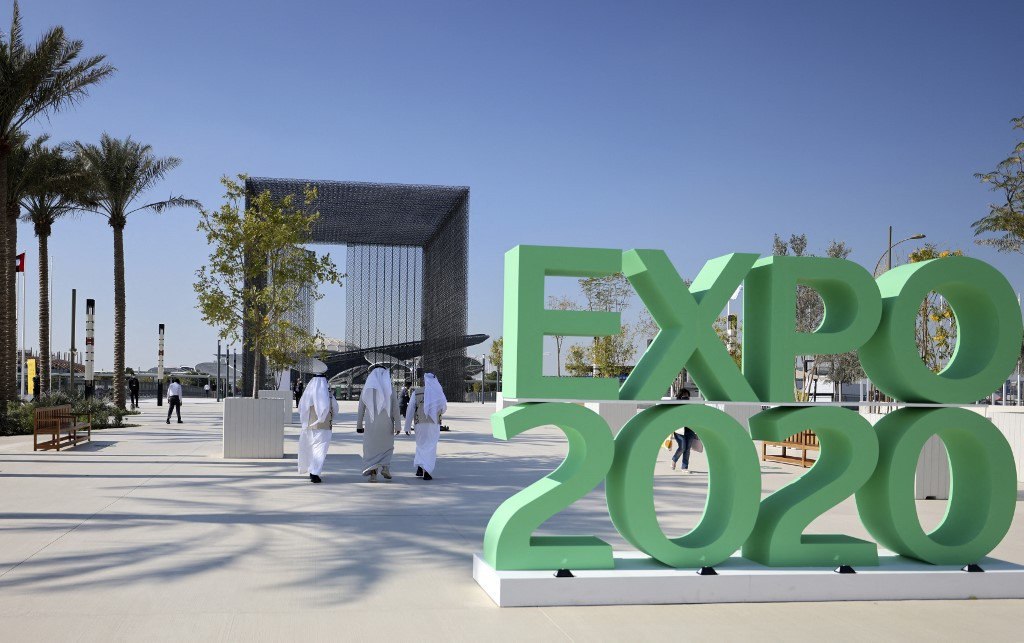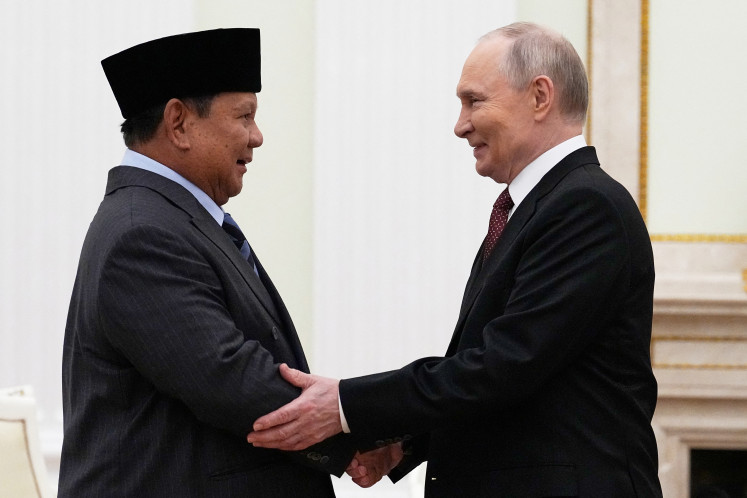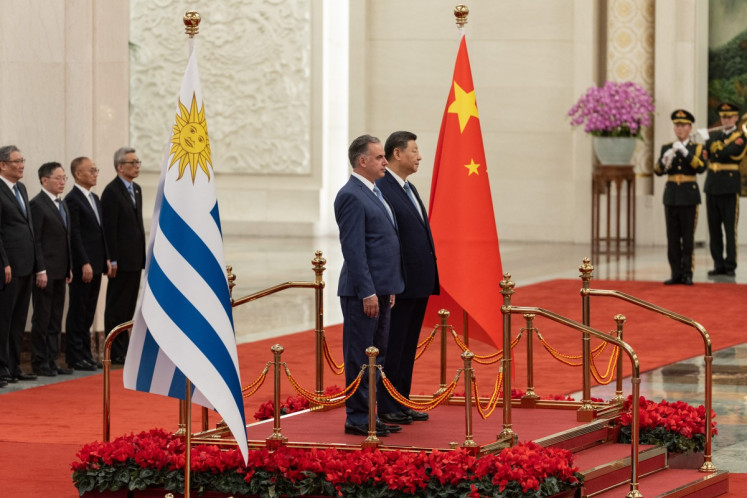Popular Reads
Top Results
Can't find what you're looking for?
View all search resultsPopular Reads
Top Results
Can't find what you're looking for?
View all search resultsExpo 2020: Blueprint for smart cities and a better life
Investments to make cities smarter are predicted to more than double from $100 billion in 2021 to $250 billion in 2030.
Change text size
Gift Premium Articles
to Anyone
 People walk past the official sign marking the Dubai Expo 2020 near the Sustainability Pavilion in Dubai on Jan. 16, 2021. The six-month world fair, a milestone for the emirate which has splashed out $8.2 billion on the eye-popping venue in the hope of boosting its soft power and resetting the economy. (AFP/Karim Sahib)
People walk past the official sign marking the Dubai Expo 2020 near the Sustainability Pavilion in Dubai on Jan. 16, 2021. The six-month world fair, a milestone for the emirate which has splashed out $8.2 billion on the eye-popping venue in the hope of boosting its soft power and resetting the economy. (AFP/Karim Sahib)
I
mproving everyday life takes foresight, imagination and a sense of purpose. Advances in technology alone are not enough to secure progress. To quote Steve Jobs, one of the greatest visionaries of our time: “The people who are crazy enough to think they can change the world are the ones who do.”
Humanity has dreamed about utopia – the place where everything is perfect – for centuries. Yet that vision is different for every one of us. The lowest common denominator for a modern utopia – as we face the 21st century challenges of population growth, global warming and rapid urbanization – is a connected, resource efficient, and sustainable environment.
Smart cities have been a long time coming. Now, advances in artificial intelligence, 5G, cloud technology, big data and the internet of things, are aligning reality with user expectations. Pundits agree: a city is smart when public and private sectors use technology and cooperate for the well-being of citizens, for environmental sustainability and prosperity.
Dubai’s Expo 2020 campus is arguably the world’s best example to date of a purpose-built, connected urban environment.
Expo 2020 Dubai now underway is the first expo ever held in the Middle East, Africa and South Asia. Powered by AI, separate platforms to manage energy, smart-buildings and security work together to create synergy and efficiency. They allow building managers to control functions such as cooling, air quality, access and fire alarms – in real time using an app.
This isn’t technology for its own sake. It draws information from 200,000 data points, 3,500 doors and 15,000 cameras to optimize operations, reduce emissions, enhance visitors’ comfort and security – all at once, seamlessly. It saves energy. It balances the peaks and troughs of renewable power. It optimizes battery storage and e-mobility charging.
Expo 2020’s theme is “connecting minds and creating the future.” It speaks to smart cities’ potential: Smartification will transform city administration, transportation, health and public safety – a process some analysts expect to generate global economic benefits of US$20 trillion through 2026.
That’s why investments to make cities smarter are predicted to more than double from $100 billion in 2021 to $250 billion in 2030. Much will be by the private sector – in smart buildings and smart microgrids, as well as by government. Everyone will benefit as technology makes fast-growing cities more resilient.
A decarbonizing world needs cities that can better integrate renewable power from roof-top solar panels and wind turbines. It needs cities that are better able to manage traffic flows, more efficient in their management of water and wastewater, cities with clean air and efficient government.
His Highness Sheikh Mohammed bin Rashid Al Maktoum’s vision is to make United Arab Emirates one of the best countries in the world. For many, Dubai’s skyline epitomizes the city of the future. And the Smart Dubai Government initiative has digitalized the administration, serving citizens at the touch of an app, and becoming paperless in the process. The ultimate aim: to make Dubai the “happiest city on earth.”
Science fiction has shown us many visions of what may come. Happy doesn’t always figure large. The world’s first smart city, Metropolis, was born nearly 100 years ago in Berlin, in the minds of moviemaker Fritz Lang and his wife, Thea von Harbou. It was a dystopia, a story of its era.
The modern vision of a smart city is different. Technology is a necessity, not a luxury. If digitalization is the brain, then sustainability is the heart. We need it to decarbonize our world and future proof our urban centers. To make cities efficient, responsive, and fit for the challenges we see coming – sustainability, population growth and rapid urbanization – and for the ones that will surprise us.
City smartness is a question of degree – and intent. The Smart City Index was created in 2019 by Switzerland’s Institute for Management Development and the Singapore University for Technology and Design. Its ranking is based on economic and technological data, as well as citizens’ perceptions. Last year, the top places went to Singapore, Helsinki and Zurich – Berlin ranked 38th, Dubai 43rd, Madrid 45th.
Expect that ranking to change next year. After Expo ends, its smart infrastructure will be used to create a new, human-centric community in Dubai South, called District 2020. This innovation-driven ecosystem and mixed-use development will evolve in the years ahead, with Siemens as an anchor tenant.
We’re making the whole city comfortable, safe and efficient by focusing on the human experience. Expo 2020 is a showpiece project as a whole, illustrating the breadth and scope of our technology. Different businesses, one purpose: making the world a better place to live.
And yet digitalization is just a tool. Our intentions are what will shape smart cities into that which they should be: sustainable, connected, and prosperous with clean water, safe mobility and green power for all. In short: wonderful. As another American, Abraham Lincoln, once said: “The most reliable way to predict the future is to create it.”
***
The writer is managing board member of Siemens AG and CEO of Smart Infrastructure.









